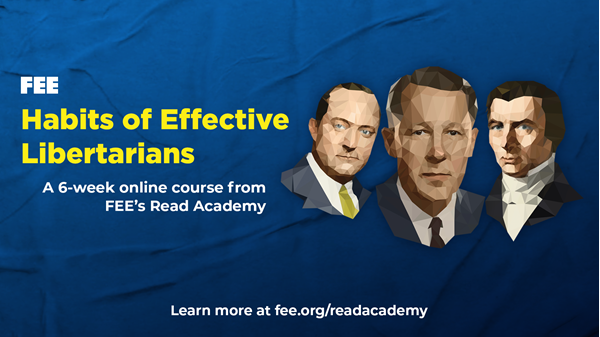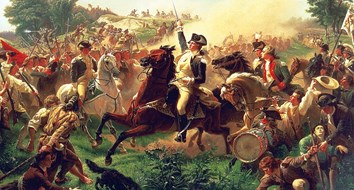What does the cause of liberty need most?
Leonard E. Read, the founder of FEE, insisted that what liberty needs most is not better politics, propaganda, or marketing, but better thought leadership. What libertarians face, Read wrote, is not a “political action” problem, a “mass reformation problem,” or a “selling problem,” but a “leadership problem.”
Lead, Teach, Study
Thought leaders, Read clarified, “are to be found in every walk of life,” not just in fields like academia and journalism. And their spheres of influence will be of varying sizes. Some will be public figures with followings in the millions. Others will be moral and intellectual pillars of their communities: ideological good influences within their close circles. Leadership at both scales is required for liberty to live. Thus, effective libertarians are effective leaders.
Good thought leadership is the practice of leading minds out of the darkness of ignorance and into the light of understanding. Thus, effective leaders are effective teachers.
Furthermore, as Read wrote:
It is self-evident that the only way to overcome one’s own ignorance is through learning. And, it is equally evident that teaching is the only way one can help to overcome another’s ignorance. But a teacher is never self-designated; the teacher is selected by the person who chooses to be taught. Therefore, learning—teachableness—is the only way to qualify for teaching.
Thus, effective teachers are effective students. And, as Read characterized it, the problem libertarians face is at once a “leadership problem” and a “learning problem.”
By Read’s reasoning, we can infer that effective libertarians must be effective students of liberty. And it further follows that, to be an effective libertarian, one must develop good study habits with regard to the ideas of liberty.
Effective study, according to Read, encompasses both regular reading to encounter new ideas and regular writing to master and retain them. “So far as the memory is concerned,” Read wrote, “writing aids indelibility.” Furthermore:
Writing is the best way to formulate ideas, even to have ideas. One cannot formulate ideas in writing without thinking. Writing is a hard taskmaster, a severe discipline. It is easy to conclude that an idea is mastered—until the attempt is made to put it in writing. Instantly, many of its imperfections become apparent. An idea which cannot be written is an idea not mastered or possessed.
A Study Habits Course from FEE
To help libertarians form effective reading and writing habits, I will be teaching an online course called Habits of Effective Libertarians. The course will launch on Tuesday, February 20, 2024 and will run for six weeks. It is available to all subscribers to FEE’s Leonard E. Read Academy for Libertarian Leadership. After the course, the lecture recordings, readings, and assignments will be archived and available on-demand to all Read Academy subscribers. Subscriptions cost $5 a month. Click here to learn more and sign up.
Students enrolled in Habits of Effective Libertarians will be challenged and coached to design, develop, and track both daily reading habits and daily writing habits. To aid that endeavor, students will learn habit formation principles drawn from such books as Atomic Habits by James Clear and Elastic Habits by Stephen Guise. Students will be provided a structure for translating those principles into straightforward daily goals and routines.
Students will also be taught the “key word outline” method: an easy way to practice writing and master ideas from your daily reading by formulating them in your own words.
And students will learn:
- how to generate and capture their own ideas for original content
- techniques for developing and expressing those ideas through writing and publishing (e.g., tweets, video scripts, articles, etc.)
- how to prune and polish their prose through editing workshop sessions
- how to use their writing to prep for unscripted public speaking engagements (e.g., podcasts, livestreams, etc.)
The methods they learn and habits they form through this course can help libertarians become voracious readers, prolific writers, eloquent speakers, and leading lights in their local and online communities.
And that is what the cause of liberty needs most of all.






